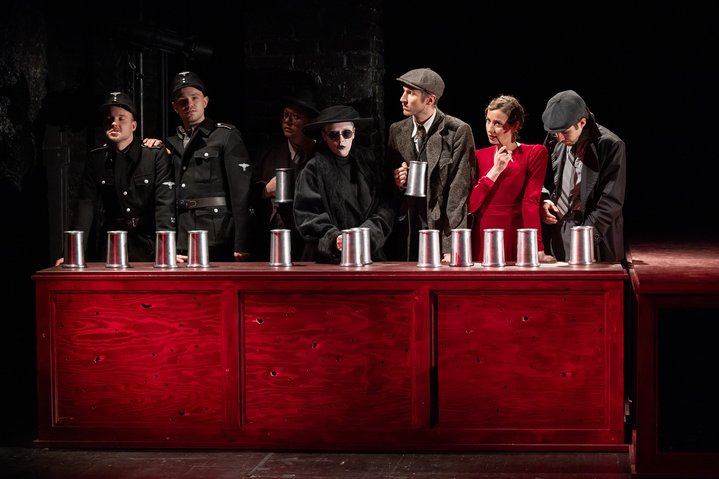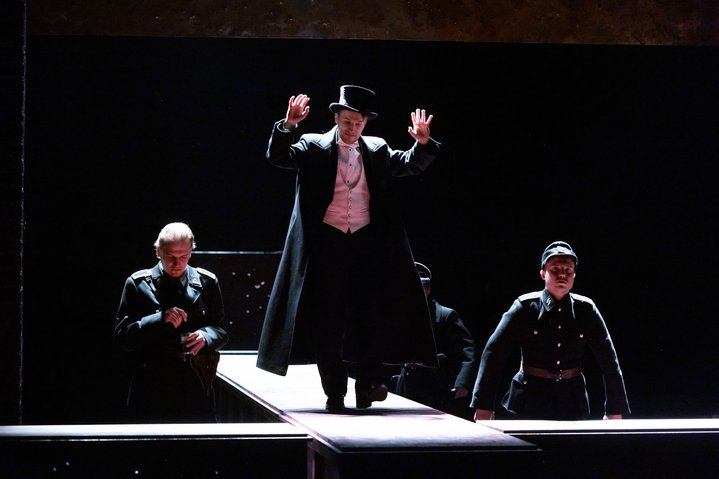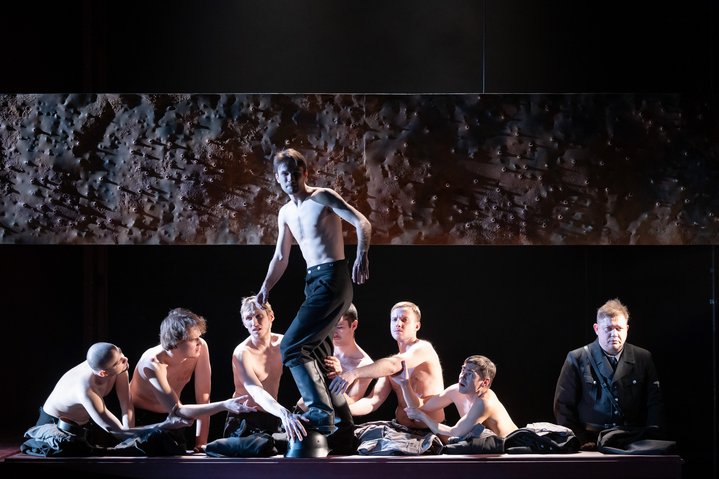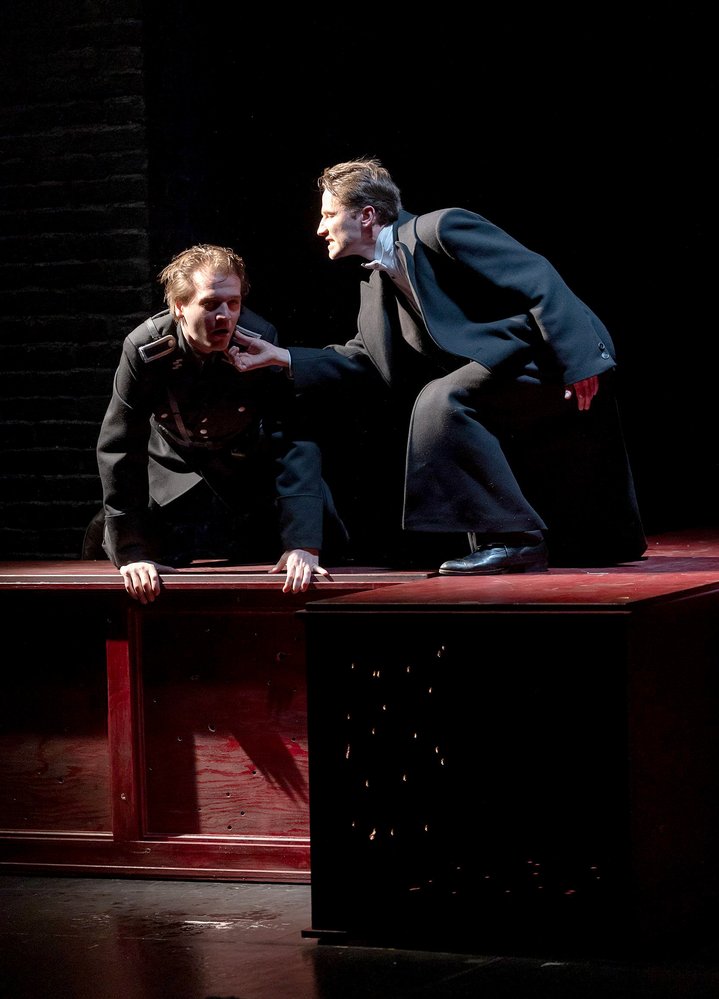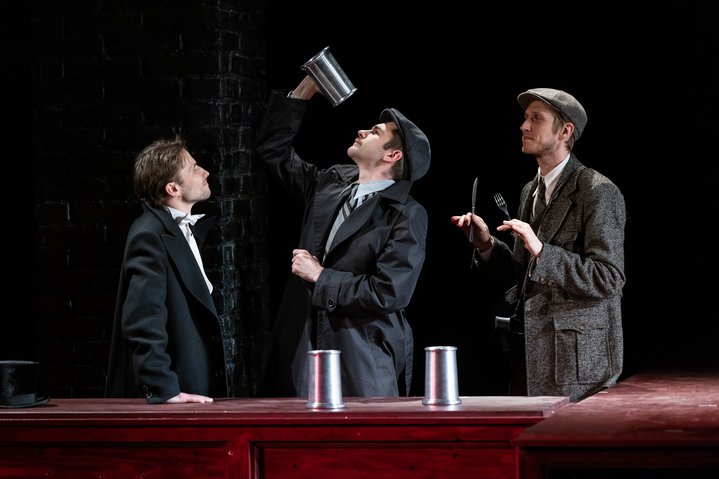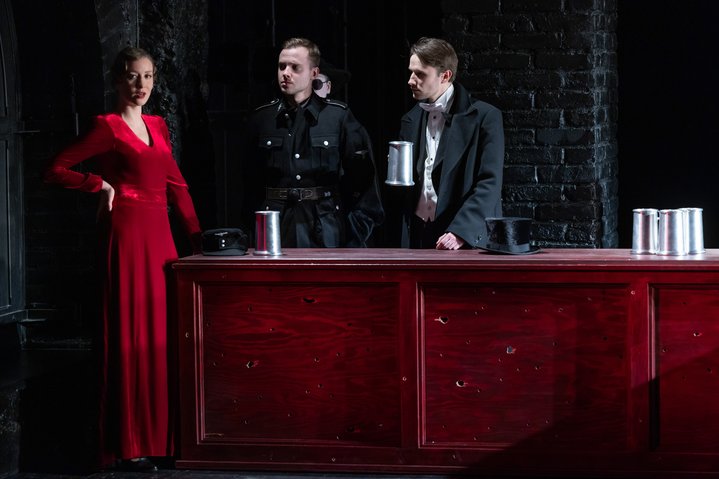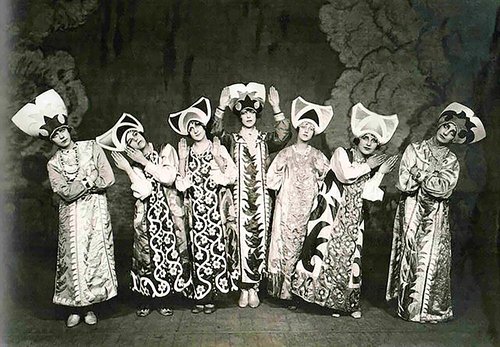War in the Words of Brecht

Brecht. Schweik. World War II. The Theatre Art Studio. Moscow, 2024. Photo by Alexander Ivanishin. Courtesy of The Theatre Art Studio
There is an ever-increasing number of military conflicts around the world today, a chilling, yet fitting backdrop to the premiere of ´Brecht. Schweik. World War II’ at the Theatre Art Studio in Moscow.
Moscow´s Theatre Art Studio is the cosiest of thespian havens, with a welcoming vibe, upon arrival you are invited to grab an apple from a long dining table in the entrance. Resident, in-house artist Alexander Borovsky has designed the foyer to resemble an old Moscow apartment with vintage tables, cupboards and bookcases that you can open, where you can take a book down from the shelves and read a line from any play currently showing at the theatre.
If there are apples laid on for the audience on every night of the week, some performances are preceded by a special programme or event to put you in a particular mood. Before ‘Moscow-Petushki’, a play based on Russian writer Venedikt Erofeev's 1970 postmodernist novel, vodka was served with typical seventies style snacks like sprat in tomato, pickled cucumbers and black bread. Before ‘Zapovednik’ by Sergei Dovlatov, another legendary Soviet writer, you encounter a cask of wine in the foyer and a cheerful waitress in a white headdress serving copious glasses of wine.
However, before ‘Brecht. Schweik. World War II’ there are no such treats and the audience is quickly immersed into the dark theme through the laconic set designed by Evtenia Shutina. There is a low structure which serves as podium, bar counter and prison cell, shimmering in blood-red, a metal sheet shot through with bullets hangs ominously above the stage. All very minimalist yet expressive. During the interval, this structure serves as a tribune for the character playing Adolf Hitler with his terrifyingly recognisable asymmetrical forelock and barking speech, here played by Sergei Abroskin who sets a simultaneously sinister and comical tone. He is interested to find out how ordinary people feel towards him, not only in Germany but also in the countries he conquered and questions whether such feelings could be relied on in future attempts to conquer the world.
Meanwhile, the ordinary man has his own tribune: the bar counter. Here, in a pub called ´By the Bowl´, dog trader Josef Schweik and his friend Baloun talk over a pint of beer. Their conversations cover the new order in Europe, the assassination attempt on Adolf Hitler, pork loin, World War I and people´s attitudes to the Führer`s grandiose plans. The provocateur Brettschneider takes Schweik to the Gestapo where ´general stupidity versus military stupidity´ takes over, with Schweik telling endless stories, saved only thanks to his profession - the chief of the Gestapo wants a spitz-dog, and asks Schweik to steal it for him.
It was in the 1920s that Bertolt Brecht became interested in Czech writer and journalist Jaroslav Hašek (1883-1923) and his novel about a courageous soldier called Schweik. He was attracted to this kind of hero, an ordinary person who does not resist the system, but acts on it destructively. In 1943 Brecht wrote his play ‘Schweik in the Second World War’ in California, at the time a hub for intellectual emigres from Berlin, including Thomas Mann and Lyon Feuchtwanger. Schweik was not overtly theatrical enough for American audiences, but in post-war Europe the play met with success, shown to great acclaim at the Berliner Ensemble theatre (created by Bertolt Brecht in East Berlin) and at the Piccolo Teatro di Milano. Later, in Russia, ´Schweik´ had a difficult fate. In 1969, director Mark Zakharov and actors from the Satire Theatre worked on what was to be an adaptation for television based on Brecht's script, but it was never broadcast because of the Soviet invasion into Czechoslovakia.
Today at the Theatre Art Studio, the premiere of ´Schweik in World War II´ marks the opening of the student season and the cast are all students of Sergei Zhenovach the Studio´s artistic director. Many of his former pupils have become well-known directors who work in theatres across Russia such as Ulanbek Bayaliev, director of ´Schweik´. It is not Bayaliev´s first foray into Brecht: one of his first major productions was Brecht's ´Drums in the Night´ where among other colourful characters there was also a man with asymmetrical forelock and shrill voice.
Bayaliev´s ´Schweik´ is essentially a performance about an ordinary man who turns out to be a major link in epic world events, in a badly formed world in which we somehow need to learn to live with a smile. The Theatre Art Studio has a long tradition of telling stories about ordinary people who are otherwise capable of acts of greatness, so ´Schweik´ feels like an obvious choice to open the season. Today Brecht feels chillingly topical. We can relate to Baloun, ready to enlist in the German Legion and go to the front just so that he can get food to eat; Schweik is sent to the army straight from prison. Here Brechtian defamiliarization enhances the effect and what is happening seems painfully familiar. There are many associations evoked by Schweik, sensitively portrayed by Nikita Isachenkov. The whole first act is practically a monologue, periodically interrupted by the lines of other characters, ´interludes in the higher spheres´, as the dictator´s speeches are called by Brecht, and songs.
Bayaliev´s Schweik is far from the sarcastic, sharp and brave soldier from Hašek's novel and how such a man could end up at the front close to Stalingrad is a mystery left to the audience to solve. In Brecht's plays you need to read the subtle signs, although some scenes leave little space for interpretation in their directness. In the finale, after crouching, huddled under the podium on top of which the dictator is broadcasting, Schweik ultimately meets the dictator face to face on the Russian steppe.






